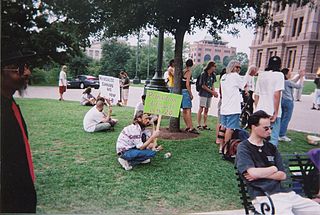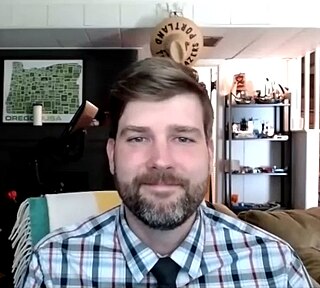
The Drug Policy Alliance (DPA) is a New York City–based nonprofit organization that seeks to advance policies that "reduce the harms of both drug use and drug prohibition, and to promote the sovereignty of individuals over their minds and bodies". The organization prioritizes reducing the role of criminalization in drug policy, advocating for the legal regulation of marijuana, and promoting health-centered drug policies.
Amendment 44 was a proposed amendment to the state statutes submitted for referendum in the 2006 general elections in the U.S. state of Colorado. The amendment proposed the legalization of the possession of one ounce or less of marijuana for any person twenty-one years of age and over, as long as marijuana use does not occur in public. The measure was eventually defeated at the polls by 60–40 percent.

In the United States, the non-medical use of cannabis is legalized in 24 states and decriminalized in 7 states, as of November 2023. Decriminalization refers to a policy of reduced penalties for cannabis offenses, typically involving a civil penalty for possessing small amounts, instead of criminal prosecution or the threat of arrest. In jurisdictions without penalty the policy is referred to as legalization, although the term decriminalization is sometimes used for this purpose as well.

Drug liberalization is a drug policy process of decriminalizing or legalizing the use or sale of prohibited drugs. Variations of drug liberalization include drug legalization, drug relegalization, and drug decriminalization. Proponents of drug liberalization may favor a regulatory regime for the production, marketing, and distribution of some or all currently illegal drugs in a manner analogous to that for alcohol, caffeine and tobacco.

Cannabis in Oregon is legal for both medical and recreational use. In recent decades, the U.S. state of Oregon has had a number of legislative, legal, and cultural events surrounding use of cannabis. Oregon was the first state to decriminalize the possession of small amounts of cannabis, and among the first to authorize its use for medical purposes. An attempt to recriminalize possession of small amounts of cannabis was turned down by Oregon voters in 1997.
The U.S. state of Oregon has various policies restricting the production, sale, and use of different substances. In 2006, Oregon's per capita drug use exceeded the national average. The most used substances were marijuana, methamphetamine and illicit painkillers and stimulants.
The legal status of unauthorised actions with psilocybin mushrooms varies worldwide. Psilocybin and psilocin are listed as Schedule I drugs under the United Nations 1971 Convention on Psychotropic Substances. Schedule I drugs are defined as drugs with a high potential for abuse or drugs that have no recognized medical uses. However, psilocybin mushrooms have had numerous medicinal and religious uses in dozens of cultures throughout history and have a significantly lower potential for abuse than other Schedule I drugs.
The drug policy of Portugal, informally called the "drug strategy", was put in place in 2000, and came into effect in July 2001. Its purpose was to reduce the number of new HIV/AIDS cases in the country, as it was estimated around half of new cases came from injection drug use.

Oregon Ballot Measure 80, also known as the Oregon Cannabis Tax Act, OCTA and Initiative-9, was an initiated state statute ballot measure on the November 6, 2012 general election ballot in Oregon. It would have allowed personal marijuana and hemp cultivation or use without a license and created a commission to regulate the sale of commercial marijuana. The act would also have set aside two percent of profits from cannabis sales to promote industrial hemp, biodiesel, fiber, protein, and oil.

In the United States, cannabis is legal in 38 of 50 states for medical use and 24 states for recreational use. At the federal level, cannabis is classified as a Schedule I drug under the Controlled Substances Act, determined to have a high potential for abuse and no accepted medical use, prohibiting its use for any purpose. Despite this prohibition, federal law is generally not enforced against the possession, cultivation, or intrastate distribution of cannabis in states where such activity has been legalized.

Cocaine is the second most popular illegal recreational drug in the United States behind cannabis, and the U.S. is the world's largest consumer of cocaine. In 2020, Oregon became the first U.S. state to decriminalize cocaine.

The legal history of cannabis in the United States began with state-level prohibition in the early 20th century, with the first major federal limitations occurring in 1937. Starting with Oregon in 1973, individual states began to liberalize cannabis laws through decriminalization. In 1996, California became the first state to legalize medical cannabis, sparking a trend that spread to a majority of states by 2016. In 2012, Washington and Colorado became the first states to legalize cannabis for recreational use.
Peter Zuckerman is an American journalist and author who has focused his career in court reporting, investigative journalism, and adventure stories. He is also a leader of several prominent progressive political campaigns.

Cannabis in South Dakota is legal for medical use as of July 1, 2021, having been legalized by a ballot initiative on November 3, 2020. Prior to then, cannabis was fully illegal, with South Dakota being the only U.S. state which outlawed ingestion of controlled substances. Testing positive for cannabis can be a misdemeanor offense. South Dakota would have become the first state in US history to legalize recreational and medical cannabis simultaneously, but an amendment legalizing recreational marijuana that was approved in the same election was struck down as unconstitutional the following February. The challenge claimed the amendment violated Amendment Z, the "Single-Subject Rule". The decision was appealed to the South Dakota Supreme Court, which upheld the lower court's decision on November 24, 2021.

Cannabis in Texas is illegal for recreational use. Possession of up to two ounces is a class B misdemeanor, punishable by up to 180 days in prison and a fine of up to $2000. Several of the state's major municipalities have enacted reforms to apply lesser penalties or limit enforcement, however.

Cannabis in Missouri is legal for recreational use. A ballot initiative to legalize recreational use, Amendment 3, passed by a 53–47 margin on November 8, 2022. Possession for adults 21 and over became legal on December 8, 2022, with the first licensed sales occurring on February 3, 2023.

Cannabis in Ohio is legal for recreational use. Issue 2, a ballot measure to legalize recreational use, passed by a 57–43 margin on November 7, 2023. Possession and personal cultivation of cannabis became legal on December 7, 2023, with the first licensed sales yet to occur under the law. Prior to legalization, Ohio decriminalized possession of up 100 grams in 1975, with several of the state's major cities later enacting further reforms.

In Washington, D.C., cannabis is legal for both medical use and recreational use for possession, personal use, cultivation, transportation and gifting, and for retail sale once a regulatory system is implemented following an affirmative vote by the residents on a 2014 ballot initiative. The United States Congress exercises oversight over the government of the District of Columbia, preventing the local government from regulating cannabis sales like other jurisdictions with authority derived from a U.S. state.

The movement to decriminalize psilocybin in the United States began in 2019 with Denver, Colorado, becoming the first city to decriminalize psilocybin in May of that year. The cities of Oakland and Santa Cruz, California, decriminalized psilocybin in June 2019 and January 2020, respectively. Washington, D.C., followed suit in November 2020, as did Somerville, Massachusetts, in January 2021, and then the neighboring Cambridge and Northampton in February 2021 and March 2021, respectively. Seattle, Washington, became the largest U.S. city on the growing list in October 2021. Detroit, Michigan, followed in November 2021.

Michael Schmidt is an American attorney and prosecutor. He has served as the Multnomah County District Attorney since August 2020. Originally set to begin his term on January 1, 2021, Governor Kate Brown appointed him to the job early, in August of 2020, to replace Rod Underhill, who retired in July.











